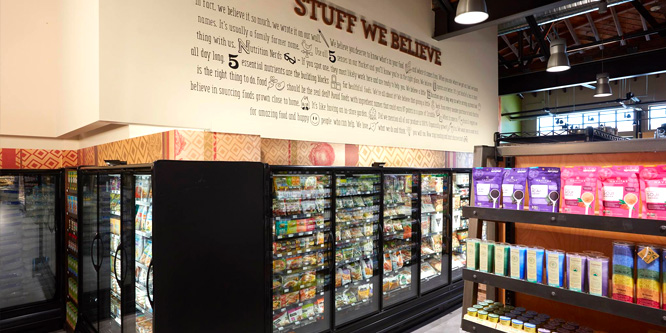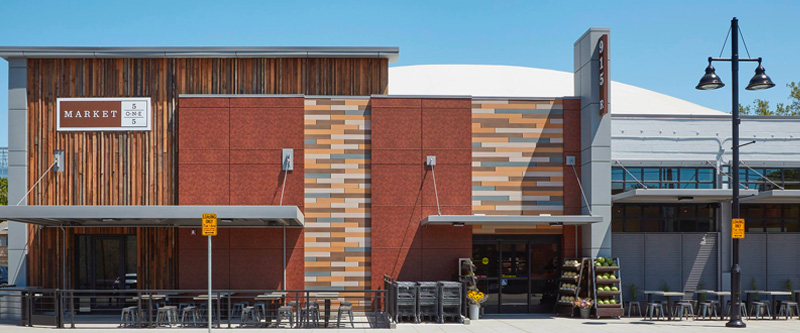
Photo: Market 5-ONE-5
New organic grocery concept is an educational experience
West Coast regional grocer Raley’s is introducing an element of education into its new organic store concept.
The concept, named Market 5-ONE-FIVE, opened earlier this month in Sacramento, CA, promising to feature in-store experts such as chefs, “foodies,” urban farmers and a dietitian, according to an article in Produce Retailer. The company positions education as one of the store concept’s key pillars and says that it hopes to take the guesswork out of customers’ understanding of nutrition.
The Market 5-ONE-5 website’s education section gives examples of meet and greets with local farmers and talking to deli experts as ways the store works to inform customers.
In-store classes and other educational resources have become a more common part of the retail experience in recent years. Whole Foods customers can find extensive in-store educational experiences at the chain’s flagships. The Whole Foods location in Lincoln Park, Chicago, for instance, features a full calendar of cooking classes, wine appreciation classes and demonstrations.

Outside of grocery, the Apple Store is known for its continually growing list of tech workshops and training sessions that teach customers how to get the most out of the Apple products they purchase.
Even mass retailers like Target are trying to move toward a model that relies more on store staff expertise and knowledge. Earlier this year Target CEO Brian Cornell announced a shift in strategy toward hiring experts to staff each department in its stores.
Raley’s has been pursuing expansion beyond the introduction of the new concept. The chain acquired five Scolari Food & Drug stores and one Sak ‘N Save in Nevada in recent months, according to Supermarket News. The Scolari stores will reopen as Raley’s locations, and the Sak ‘N Save will remain under its own banner. This will bring Raley’s total store count to 128 in California and Nevada.
- Raley’s launches new concept focused on organic, nutrition and education – Produce Retailer
- About Us – Market 5-ONE-5
- Lincoln Park’s Cooking Classroom – Whole Foods Market
- How personal can Target’s customer service get? – RetailWire
- Raley’s brings acquired Scolari’s stores under its banner – Supermarket News
Discussion Questions
DISCUSSION QUESTIONS: What role do educational experiences have to play in modern retailing? How do you see retailers using their resources — stores, offsite events, websites, social media, etc.— to educate and connect with consumers going forward?


Physical retailers need to find ways to attract shoppers to their stores. Education, classes about food, nutrition, etc. are great content and make shoppers more engaged with and positive about the brand. This approach should be handled as a “multichannel” effort, and this content should be available in-store and online. A good teaser could be small surveys to clients about areas of interest, asking them questions about specific topics such as nutrition, wine, organic food, etc.
Raley’s decision to add the human elements back into the shopper’s journey is a good one. Integration with digital and social is the way to go to provide an engaging and inspiring trip that will drive sales over the long term.
The grocery world – even within the organic store segment – is largely commoditized from a product standpoint. Plus, many grocers are growing their online ordering capabilities, further commoditizing the grocery experience. One major differentiation opportunity is the in-store experience other than the actual products. The organic segment plays well to the in-store opportunities, as organic consumers are hungry for knowledge, education, recipes and experiences. Maybe Market 5-One-Five can do for this segment what REI has done successfully with their in-store classes and experiences within the outdoor adventure and camping retail segment.
Too often education is used to simply profile products. The veil over product promotions can be very thin and the education approach really works against the retailer. Retailers should keep it objective, profile multiple competing products and focus on value to the consumer.
Just another great example that what is old is new again. When I worked for a major grocer in Chicago in the ’70s, they employed “Home Economists,” local experts in everything related to the products they sold in the store. This is a great update to that tactic.
Education has a role in retail and enhancing in-store experience but it should be initiated in response to interest or inquiry. I thought about this for the first time just last weekend as I was poking around in a high-end gourmet and wine shop in New York. A woman in an apron accosted me at the wine counter and launched into an unsolicited tutorial. She really knew her stuff and insisted on telling me all about the attributes, history and taste profiles of a red wine varietal after I told her I preferred white (“you should switch back and forth” she told me). I hadn’t asked for any tips to begin with and after five minutes or so had to politely disengage in order to make it to a meeting. I never had to think about this possibility until it happened.
Retail is becoming more about theater and providing the customer with a great experience. Educating people about organic food is just one part of that. Now that the retail mix has this additional element, making sure they are great quality and fresh is vital. Having products on-shelf in the right place and at peak freshness can be a challenge, one that technology is helping in a lot of fresh food and grocery outlets. This helps deliver an experience that will bring customers back, something that will differentiate the physical retailers from digital ones and is a key ingredient for success. This is a great initiative and one that many more retailers will be following in the coming years.
All retailers need to ask themselves what value they are adding to the consumer. If they can’t answer this clearly, then they have a problem!
Initiatives like this are an example of adding value. Consumers have a lot of questions and concerns when it comes to food and nutrition, so providing education to help guide them is useful.
A great grocer will be the one that takes the commodity they sell, food, and entrances the consumer with the myriad passions we have about food: gourmet consuming experiences, the thrill of creating a dish successfully, the ways taste creates memories, etc. They do this through consistently well-curated enticing product offerings, passionate staff in each department, and yes, in-store education through one-on-one discussions and, in this case, classes. This is how they can move from being a commodity retailer to an experiential retailer. And the examples we know of REI, Nordstrom, Apple, The Container Store and many others point to the efficacy of this approach across categories.
Education is great when it’s adding value for the customer. If it’s just a thinly veiled way to launch into a hard sales pitch or it’s forced upon customers who don’t want it, then it’s a good way to turn people off. The trick is to use it in a way that benefits the customer — Apple’s free courses are a good example. Yes, you’re learning how to use Apple products, but they’re fun and informative sessions in their own right. Raley’s idea hopefully will also use education to make people feel closer to the food they’re buying.
I guess the answer depends a lot on how you define “education.” Traditionally, retailers, along with producers, have been quite happy to “educate” consumers to the benefits of using their products; sometimes these efforts have been truthful, or practical, sometimes they’ve been little more than propaganda. But education on more general topics like “nutrition” or “ecology” have been rarer, and it’s not hard to see why (there’s no immediate benefit to the seller).
Could this change? I suppose there is a group — how big I don’t know — who would both appreciate and trust the efforts of a store to become a teacher, and with them the efforts could become a marketing advantage. But I think it might prove difficult to quantify the benefits, and I have to wonder what happens if a lot of consumers become “educated” to the idea that a lot of what the retailer sells isn’t something they should be buying.
Grocers want to lure shoppers to their stores, and engage them. Shoppers want to learn more about food, nutrition, etc. from local experts.
Combine these two desires, and you have the Raley’s concept store. Bravo!
Educational experiences are a way to connect with shoppers. They provide the perfect opportunity to showcase products in an exciting atmosphere. Especially when it comes to a new food item, giving shoppers the opportunity to learn why it is healthy and how they can cook with it is something that they will remember, tell others about, and the product might even make it onto their shopping list.